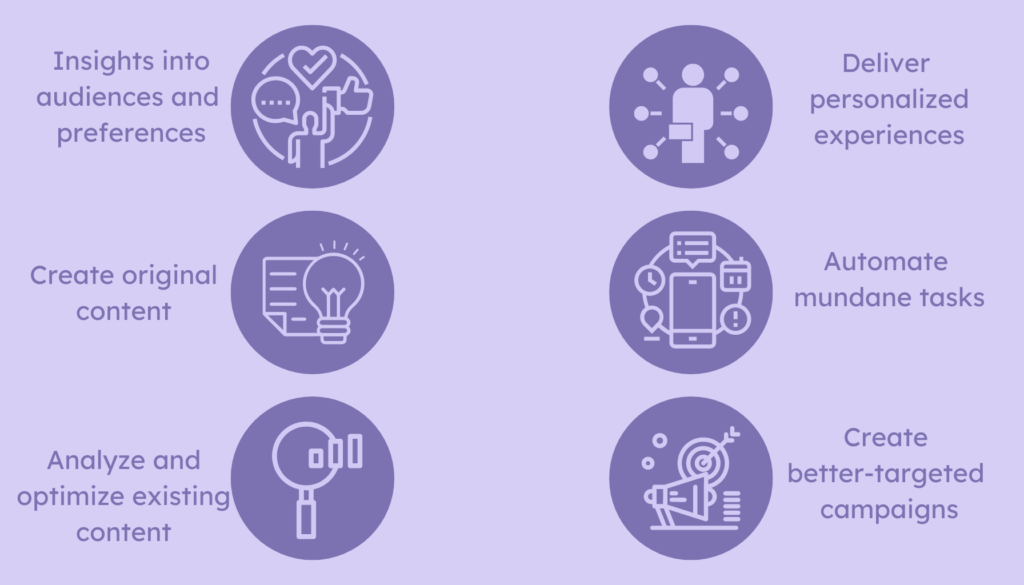In today’s digital age, social media has become an integral part of our daily lives. Platforms like Facebook, Twitter, and Instagram allow us to connect with others and share our experiences with the world. However, with so much content available, it can be challenging to create a personalized social media experience that truly reflects our interests and preferences.
Enter artificial intelligence (AI). With AI, social media platforms can now analyze our behavior and preferences to create personalized experiences tailored to our individual needs. From recommending content based on our interests to suggesting new connections, AI is revolutionizing the way we interact with social media. In this article, we’ll explore the ways in which AI is being used to create personalized social media experiences and the benefits it offers to both users and businesses.

Using AI to Create Personalized Social Media Experiences
Social media platforms have become an integral part of our daily lives. With over 3.8 billion social media users worldwide, it has become a crucial tool for businesses to connect with their customers. However, with so much content available, it can be challenging to capture the attention of your target audience. This is where artificial intelligence (AI) comes in. By using AI, businesses can create personalized social media experiences that engage and retain their customers.
What is AI and How Does it Work?
Artificial intelligence is the ability of machines to learn and perform tasks that normally require human intelligence, such as speech recognition, decision-making, and language translation. AI algorithms use vast amounts of data to identify patterns and make predictions based on that data. In the case of social media, AI can be used to analyze user behavior and preferences, and provide personalized content and experiences based on that analysis.
One of the most common ways AI is used in social media is through recommendation systems. These systems analyze user data and provide personalized recommendations based on their interests and behavior. For example, if a user frequently engages with posts about travel, a recommendation system may suggest travel-related content or accounts to follow.
The Benefits of Using AI for Personalization
Personalization is key to creating engaging social media experiences. By using AI to analyze user data, businesses can provide personalized content and recommendations that are relevant and valuable to their customers. This can lead to increased engagement, loyalty, and ultimately, revenue.
One of the main benefits of using AI for personalization is its ability to scale. AI algorithms can process vast amounts of data much faster than humans, allowing businesses to provide personalized experiences to a large number of customers simultaneously. This can save time and resources while still providing a high level of personalization.
Another benefit of using AI is its ability to adapt to changing user behavior. As users interact with social media platforms, their preferences and behavior may change. AI algorithms can quickly adapt to these changes and provide updated recommendations and content that reflect the user’s current interests.
AI vs. Traditional Methods of Personalization
Traditional methods of personalization, such as surveys and focus groups, can be time-consuming and costly. They also rely on self-reported data, which may not always be accurate or representative of the user’s true preferences. AI, on the other hand, uses data that is collected passively as users interact with social media platforms, providing a more accurate and up-to-date view of the user’s behavior and preferences.
Another advantage of AI is its ability to provide real-time personalization. Traditional methods of personalization often require manual intervention and can take days or even weeks to implement. AI algorithms, on the other hand, can provide personalized recommendations and content in real-time, allowing businesses to respond quickly to changing user behavior.
The Future of Personalized Social Media Experiences
As AI technology continues to evolve, the potential for personalized social media experiences will only increase. AI algorithms will become more sophisticated and accurate, allowing businesses to provide even more personalized recommendations and content. This will lead to increased engagement and loyalty, as well as greater revenue for businesses.
In addition, AI will enable new forms of personalization, such as augmented reality (AR) and virtual reality (VR). These technologies will allow businesses to create immersive social media experiences that incorporate personalized content and recommendations.
Frequently Asked Questions
In this section, we will discuss some frequently asked questions about using AI to create personalized social media experiences.
What is AI and how is it used to create personalized social media experiences?
AI stands for Artificial Intelligence which refers to the intelligence displayed by machines. AI is used to create personalized social media experiences by analyzing large amounts of data such as user behavior, preferences, and interests. This data is then used to create personalized content and recommendations for each user.
AI can also be used to automate certain tasks such as scheduling posts, responding to comments, and analyzing metrics. By using AI, social media platforms can provide a more personalized and efficient user experience.
What are the benefits of using AI to create personalized social media experiences?
One of the main benefits of using AI to create personalized social media experiences is that it can increase user engagement and loyalty. By providing users with personalized content and recommendations, they are more likely to spend more time on the platform and interact with the content.
AI can also help social media platforms to better understand their users and their preferences. This can lead to more effective advertising and marketing strategies and ultimately increase revenue for the platform.
What are the potential risks of using AI to create personalized social media experiences?
One potential risk of using AI to create personalized social media experiences is that it can reinforce existing biases and stereotypes. If the data used to train the AI system is biased, then the system will continue to produce biased output.
Another risk is that AI can be used to manipulate user behavior and emotions. By analyzing user data, AI can create content that is designed to elicit a specific response from the user. This can be used for both positive and negative purposes.
How can social media platforms ensure that AI is used ethically to create personalized experiences?
Social media platforms can ensure that AI is used ethically by being transparent about how it is used and what data is being collected. They can also implement ethical guidelines and standards for AI development and use.
Platforms can also involve diverse groups of people in the development and testing of AI systems to ensure that they are not biased and do not reinforce stereotypes. Finally, platforms can provide users with greater control over their data and how it is used.
What is the future of using AI to create personalized social media experiences?
The future of using AI to create personalized social media experiences is likely to involve even greater levels of personalization and customization. AI will be used to create more targeted and relevant content for each user, and to automate even more tasks such as customer service and advertising.
However, there are also likely to be greater concerns about data privacy and security, as well as the potential risks of AI manipulation. Social media platforms will need to balance the benefits of AI with these potential risks and ensure that AI is used in an ethical and responsible manner.

In conclusion, the use of AI to create personalized social media experiences has the potential to revolutionize the way we interact with each other online. By analyzing user data and preferences, AI algorithms can deliver customized content that resonates with individuals on a personal level.
However, it is important to consider the ethical implications of AI in social media. As AI becomes more advanced, there is a risk of creating filter bubbles and reinforcing existing biases. It is important for developers to prioritize transparency and diversity in their algorithms.
Overall, the benefits of using AI in social media cannot be ignored. It has the potential to improve user engagement and satisfaction, while also streamlining content creation for businesses. As we continue to explore the possibilities of AI, it is crucial to approach it with caution and responsibility.
Conclusion
AI is transforming the way businesses engage with their customers on social media. By providing personalized recommendations and content, businesses can create more engaging and valuable social media experiences that lead to increased engagement and revenue. As AI technology continues to evolve, the potential for personalized social media experiences is limitless. Businesses that embrace AI and use it to create personalized experiences will be well-positioned to succeed in the future.


